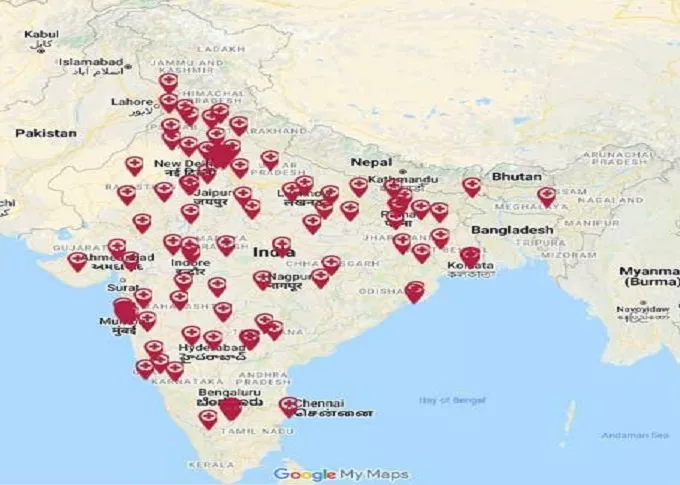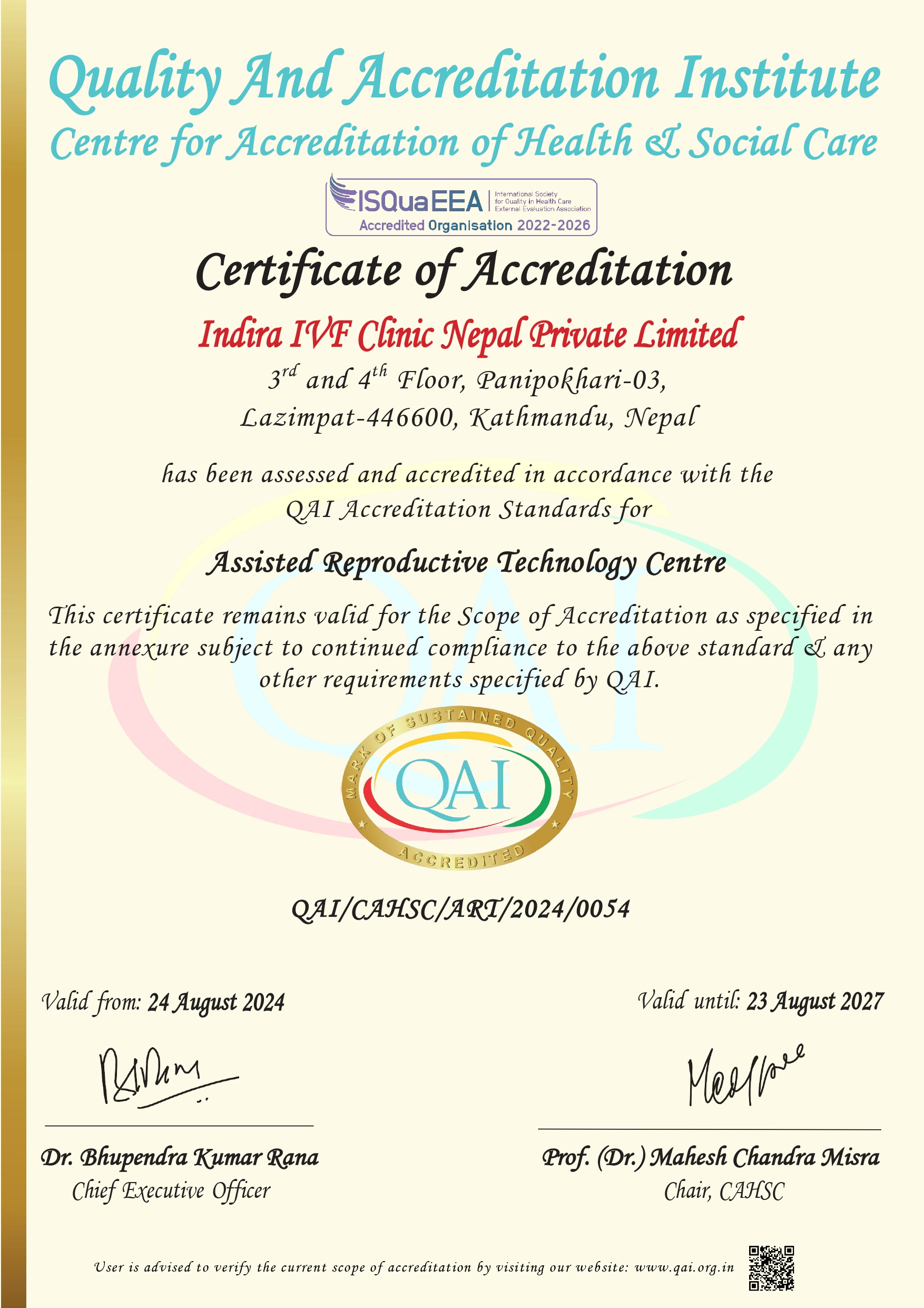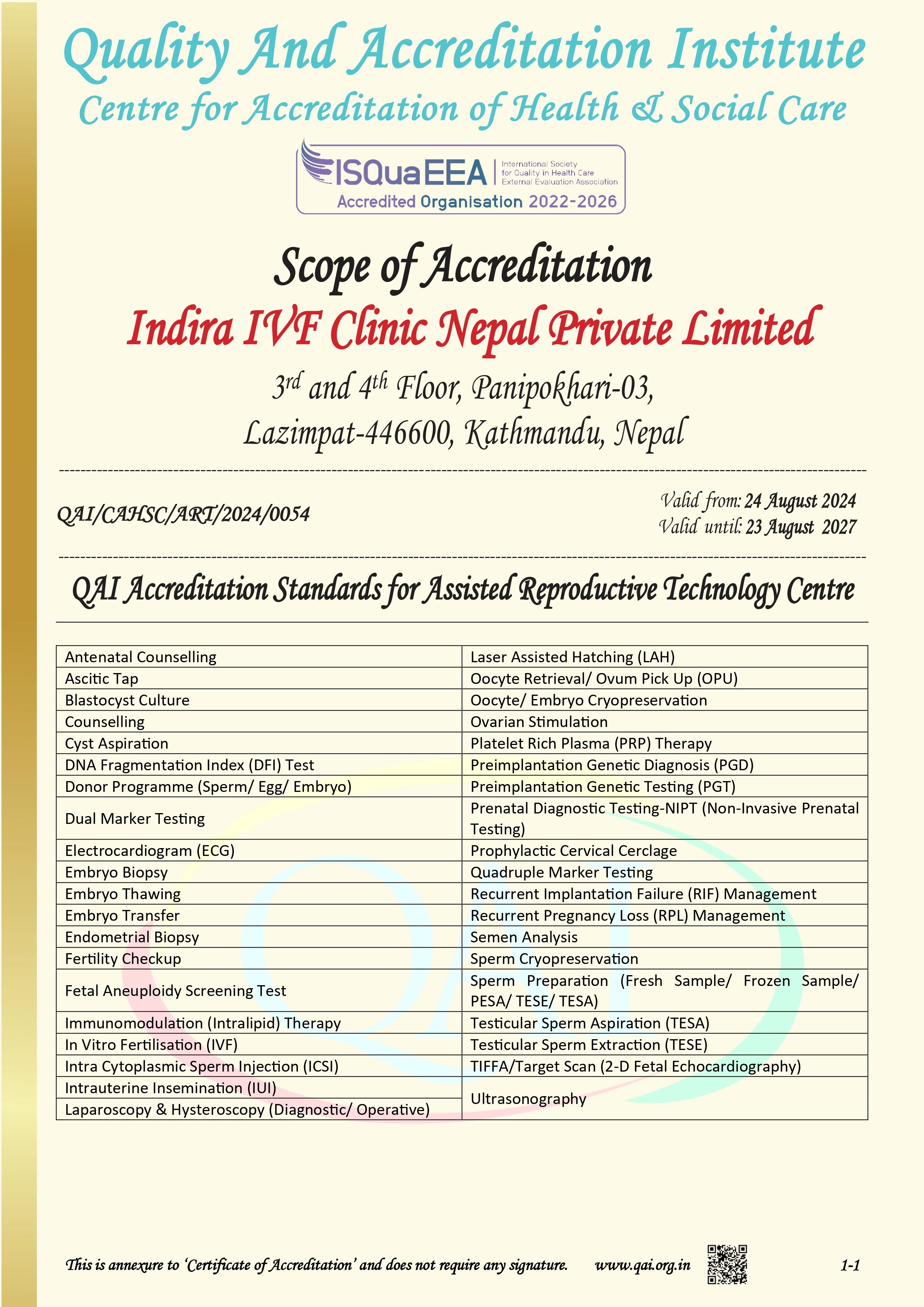Advanced Male Infertility Treatments at Indira IVF Nepal
Male infertility problems affect numerous couples worldwide, posing challenges to starting a family. However, Indira IVF is here to provide comprehensive fertility solutions. Some common male infertility problems include low sperm count, poor sperm motility, abnormal sperm morphology, erectile dysfunction, and hormonal imbalances. To determine the root cause of infertility, diagnostic tests like semen analysis, sperm DNA fragmentation index, post-ejaculation urinalysis, physical examination, and analysis of medical history are conducted. Indira IVF's top fertility experts leverage these tests to design personalized treatment plans. At Indira IVF, you can avail yourself of various male infertility treatments, including Intra-Cytoplasmic Sperm Injection (ICSI), In-Vitro Fertilization (IVF), Intrauterine Insemination (IUI), Testicular Sperm Extraction and more. We prioritize your success and strive to fulfil your parenthood aspirations.
Visit our IVF Centre in Nepal today!
Indira IVF Clinic Nepal PVT Ltd, Infront of Panipokhari Heights, Near Embassy of Japan, Panipokhari-3, Kathmandu (Nepal)-44600

Meet our Fertility Experts

Dr. Neha Homagai,
Chief Infertility Specialist, MD (OB/GYN) & MBBS
Dr. Neha Homagai is a Nepal Medical Council Registered IVF specialist. She has done her 1-year fellowship in Chennai. Dr. Neha is also a Chief Infertility Specialist at Indira IVF Centre in Kathmandu and brings unparalleled expertise in assisted reproductive technology, empowering couples to overcome infertility challenges. With compassion and extensive experience, she has become a trusted name in the field, offering unwavering support and hopes to couples on their transformative journey to parenthood.

Dr. Manisha Acharya,
IVF Specialist, MS (OB/GYN) & MBBS
Dr. Manisha Acharya is widely recognised for her profound knowledge and outstanding skills in assisted reproductive techniques. She provides exceptional care to couples struggling with infertility, guiding them towards successful outcomes. Her dedication and success rate have positioned her as one of the top fertility specialists at Indira IVF, where she continues to make a significant impact on her patients’ lives.
Few Astonishing Facts about Male Infertility

40 % - 50 %
Infertility Cases
Male factor infertility accounts for 40% - 50% of all infertility cases.

10 % - 15 %
Cases with NIL Sperm Count
About 10% -15% of infertile men have NIL sperm count (Azoospermia).

12 % - 15 %
Cases are due to Varicocele
Varicocele affects approximately 15% of all men and is the most common cause of male infertility.
What are Common Male Infertility Problems?

Low Sperm Count
Insufficient quantity of sperm in the semen, which can affect fertility.

Poor Sperm Motility
Reduced ability of sperm to move and reach the egg for fertilization.

Abnormal Sperm Morphology
Irregular shape and structure of sperm, impacting their ability to fertilize an egg.
General Causes of Male Infertility
Male infertility can arise from various underlying causes. Hormonal imbalances, including low testosterone levels, can disrupt sperm production and function. Structural abnormalities, such as blockages in the reproductive system or varicoceles, can impede the transport of sperm. Genetic disorders, such as Klinefelter syndrome, can affect sperm production or quality. Infections, such as sexually transmitted infections or reproductive tract infections, can damage sperm or block sperm passage. Lifestyle factors like smoking, excessive alcohol consumption, drug use, exposure to toxins, and obesity can also contribute to infertility in men. Certain medical conditions, including diabetes, hypertension, and autoimmune disorders, may affect fertility as well.
General Symptoms of Male Infertility
Male infertility may not always present noticeable symptoms. However, some signs may indicate an underlying issue. These include difficulty achieving or maintaining an erection, problems with ejaculation, decreased sexual desire or libido, pain or swelling in the testicles, abnormal semen volume, consistency, or colour. Hormonal imbalances may manifest as changes in hair growth, reduced muscle mass, or breast enlargement. It's important to note that experiencing these symptoms does not necessarily confirm male infertility, as further medical evaluation and a diagnostic male fertility test are required to determine the cause. Consulting a fertility specialist can help identify and address potential fertility concerns.
Male Infertility Diagnosis
Male infertility diagnosis involves a comprehensive assessment of medical history, physical examination, and specialized tests. Semen analysis is a fundamental test to evaluate sperm count, motility, and morphology. Additional evaluations may include hormone testing, genetic screening, imaging studies, and testicular biopsy. Accurate diagnosis enables tailored treatment strategies for couples facing fertility challenges. Some of the common Male Infertility Tests are:
- Semen analysis: Assessing sperm count, motility, and morphology.
- Sperm DNA Fragmentation Index: Evaluating DNA integrity within sperm.
- Post-Ejaculation Urinalysis: Examining urine after ejaculation for retrograde ejaculation.
- Physical examination: Assessing the reproductive organs for abnormalities.
- Analysis of medical history: Reviewing medical conditions, medications, and lifestyle factors.
Why Choose Indira IVF Nepal for Male Infertility Treatment?

Comprehensive Male Infertility Care
Offering a wide range of advanced treatments and services specifically designed to address male infertility concerns effectively.

Experienced and Skilled Specialists in Male Infertility
Access to highly trained fertility experts specializing in diagnosing and treating male infertility with years of experience.

State-of-the-Art Facilities for Male Infertility
Equipped with modern technologies and advanced laboratory services to ensure accurate diagnosis and optimal treatment outcomes for male infertility.
First QAI Accredited IVF/ART Centre in Nepal
Indira IVF proudly stands as the first IVF/ART Centre in the country to receive accreditation from the Quality and Accreditation Institute (QAI). This prestigious accreditation is a testament to our unwavering commitment to providing the highest standards of healthcare in fertility treatment.
The QAI accreditation is a mark of quality and assurance, indicating that our clinic not only meets but exceeds the rigorous standards set for healthcare delivery. This recognition ensures that every patient who walks through our doors can trust us to provide safe, reliable, and advanced fertility treatments. From state-of-the-art technology to highly trained professionals, our processes and protocols are designed to offer the best possible care.
Patients at Indira IVF Centre in Kathmandu can be assured that our care adheres to international standards, as our clinic undergoes regular audits and assessments to maintain this esteemed accreditation. This ensures that the quality of care you receive is always at the forefront of global best practices. We remain committed to helping you on your fertility journey with the confidence that you are in safe and capable hands.









